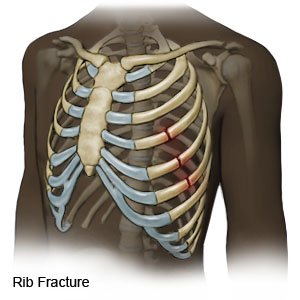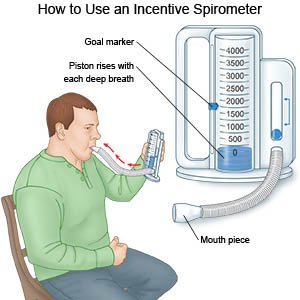Rib Fracture in Children
Medically reviewed by Drugs.com. Last updated on Aug 4, 2025.
A rib fracture is a crack or break in one or more of your child's ribs. Great force is needed to break the bones of children younger than 7 years. The force is higher than what is needed to break the bones of older children or adults. Greater force increases the risk for organ damage. Rib fractures usually heal within 2 months.
 |
DISCHARGE INSTRUCTIONS:
Call your local emergency number (911 in the US) for any of the following:
- Your child has trouble breathing.
- Your child has new or increased pain.
Seek care immediately if:
- Your child's pain does not get better, even after treatment.
- Your child has a fever.
- Your child has a cough.
Call your child's doctor if:
- You have questions or concerns about your child's condition or care.
Medicines:
Your child may need any of the following:
- NSAIDs , such as ibuprofen, help decrease swelling, pain, and fever. This medicine is available with or without a doctor's order. NSAIDs can cause stomach bleeding or kidney problems in certain people. If your child takes blood thinner medicine, always ask if NSAIDs are safe for him or her. Always read the medicine label and follow directions. Do not give these medicines to children younger than 6 months without direction from a healthcare provider.
- Prescription pain medicine may be given. Ask your child's healthcare provider how to give this medicine safely.
- Do not give aspirin to children younger than 18 years. Your child could develop Reye syndrome if he or she has the flu or a fever and takes aspirin. Reye syndrome can cause life-threatening brain and liver damage. Check your child's medicine labels for aspirin or salicylates.
- Give your child's medicine as directed. Contact your child's healthcare provider if you think the medicine is not working as expected. Tell the provider if your child is allergic to any medicine. Keep a current list of the medicines, vitamins, and herbs your child takes. Include the amounts, and when, how, and why they are taken. Bring the list or the medicines in their containers to follow-up visits. Carry your child's medicine list with you in case of an emergency.
Follow up with your child's healthcare provider as directed:
Write down your questions so you remember to ask them during your visits.
Deep breathing and coughing:
This exercise will decrease your child's risk for a lung infection. Have your child hug a pillow on the injured side while doing this exercise, to decrease pain. Ask your child to take a deep breath and hold it for as long as possible. Your child should let the air out and then cough strongly. Deep breaths help open your child's airway. Your child may be given an incentive spirometer to help take deep breaths. Put the plastic piece in your child's mouth. Have your child take a slow, deep breath. Your child should then let the air out and cough. Repeat these steps 10 times every hour.
 |
Limit your child's activity:
Your child should rest as much as possible and get plenty of sleep. This will help prevent other injuries while your child's rib heals.
© Copyright Merative 2025 Information is for End User's use only and may not be sold, redistributed or otherwise used for commercial purposes.
The above information is an educational aid only. It is not intended as medical advice for individual conditions or treatments. Talk to your doctor, nurse or pharmacist before following any medical regimen to see if it is safe and effective for you.
Further information
Always consult your healthcare provider to ensure the information displayed on this page applies to your personal circumstances.
